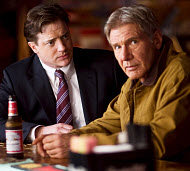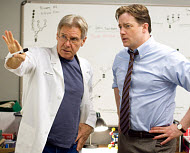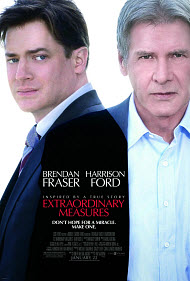Interview with actor Harrison Ford of “Extraordinary Measures”

by David Criswell, Ph.D.
Contributor
Although “Extraordinary Measures” marks Harrison Ford’s debut as a Producer, he is quick to point out that he has always been involved in many of his films behind the scenes “whether I get screen credit or not.” In this case, Mr. Ford was specifically looking to “make something I had a passion for.” He says “most people are known by commercial success, but I wanted to do something fresh.”
His interest was peaked by the book, The Cure, based on the true story of John Crowley who gave up a good job to help start a bio-tech company to search for a cure for the rare disease known as Pompe, from which his children suffer.
Because the real life story takes place over a span of many years, Mr. Ford said he was faced with the task of trying to whittle the story down to something which could fit into a 90 minute film, explain the science behind the story, and succeed in both entertaining and telling the story. Not an easy task.

One device they used was to create Dr. Stonehill who typified the scientists as a whole. Ford says he wanted a scientist who was detatched from his patients and who never even met a child with Pompe. In studying for the role, Mr. Ford said that he researched scientists, but not patients. He wanted to be in the same position as the character, so except for the Crowley children, he did not research the victims of Pompe, but instead met with and spent time with scientists in the laboratory.
Although Ford’s character, Dr. Stonehill, was known for his lack of people skills, he was supposed to be a good man under the skin. One interesting response Mr. Ford made was when asked what it was like being in a film where there are no bad guys. Harrison replied facetiously, “We are all bad.”
Although Mr. Ford did not mean this in a theological way, it is actually very true. Many of the problems we face in finding cures of such diseases stem from the sinful nature of men. This is evident from the portrayal of the corporate suits who are reluctant to spend money on a disease that only effects 400,000 people worldwide. The characters are not shown as “bad” men, but they, and bureaucrats, find themselves faced with the reality of the system, dealing with EPA regulations, and the simple reality that there must be a profit in the drug, or it will never be made.

Harrison Ford told us that the real Crowley children are doing as well as can be expected. “They will be wheelchair bound the rest of their lives and will probably be put on respirators someday, unless there are new advances made” in fighting Pompe. The children have far outlived their expected lifespan, and there is hope that further drugs and advancements may someday help them even more. Each step is a step in the right direction.
I wish Mr. Ford the best in his venture and future efforts (and, yes, he did say “Indiana Jones 5” may be in the future). Good luck, Mr. Ford.
See REVIEW Harrison Ford’s film “Extraordinary Measures.”
Relevant Questions and answers
- Why does God allow innocent people to suffer? Answer
- What about the issue of suffering? Doesn’t this prove that there is no God and that we are on our own? Answer
- Does God feel our pain? Answer
- See list of other relevant issues—questions-and-answers